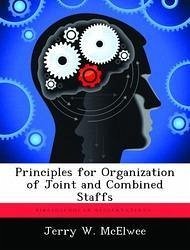Current U.S. military doctrine for organization of joint and combined staffs evolved from World War II. This paper examines military history and the modern business world to derive principles for organization of today's joint and combined staffs add then compares those principles with the current doctrine. Following a cursory review of military staff functions and staff evolution, selected Allied Joint and Combined Staffs of World War II are analyzed in detail to identify the significant factors that contributed to their success. An overriding allied concern during the war was unity of effort. Both American and British leaders strongly emphasized unity and structured and restructured their military organizations to maximize their combined efforts. This paper lists the major factors the allies considered in striving for their unity of effort. The modern business community is faced with many problems similar to those of large joint and/or combined military headquarters and are therefore a good source of managerial and organizational ideas applicable to the military. Organizational lessons learned from the most successful corporations are extracted for subsequent comparison with those from military history. The product of the comparison is six principles fro organization of joint and/or combined staffs. The paper concludes with a discussion of current joint doctrine juxtaposed with the six derived principles for staff organization. While today's doctrine is basically sound, it fails to adequately address several of the principles established in this paper. Recommendations for modifications of existing doctrine are provided to correct the shortcomings.
Hinweis: Dieser Artikel kann nur an eine deutsche Lieferadresse ausgeliefert werden.
Hinweis: Dieser Artikel kann nur an eine deutsche Lieferadresse ausgeliefert werden.








